The Keto Diet Basics: Your Easy Guide
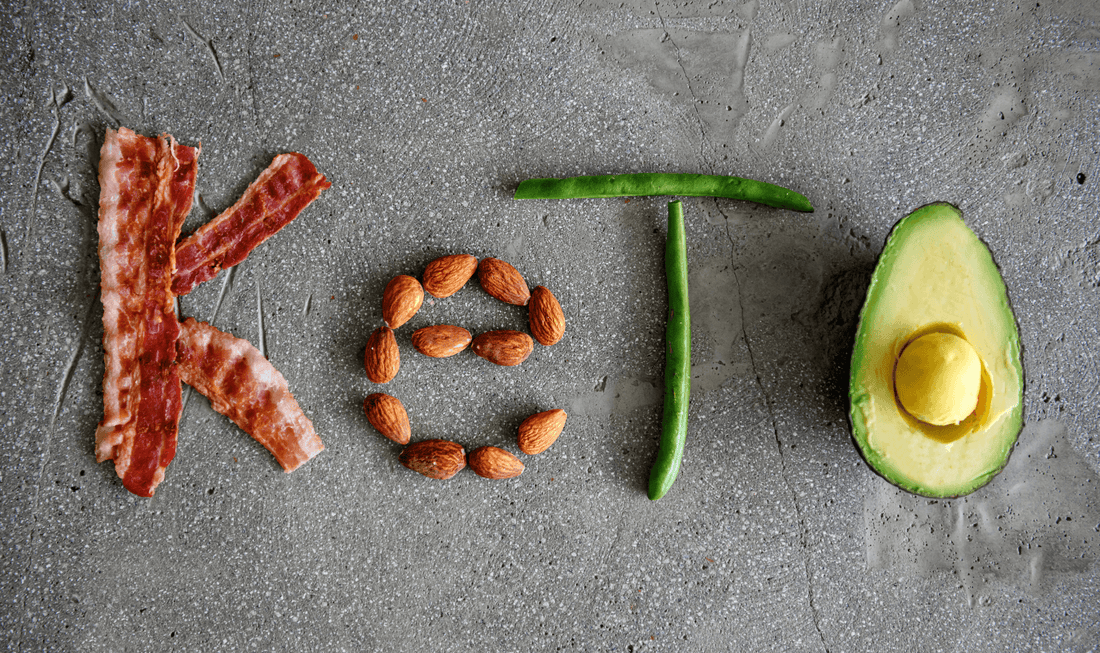
Are you ready to embark on a transformative journey towards a healthier you? Look no further than the ketogenic diet, a low-carb diet and high-fat eating plan that has taken the wellness world by storm. If you're seeking to shed those extra pounds, lose weight, and revamp your overall well-being, this detailed beginner's guide to keto is your ultimate companion.
So, what exactly is the ketogenic diet? It's a revolutionary approach to weight loss and improved health that involves drastically reducing your carbohydrate intake while increasing your consumption of healthy fats. By doing so, your body enters a metabolic state known as nutritional ketosis. In this state, instead of relying on glucose for energy, your body turns to its fat stores, effectively burning fat for fuel.
The benefits of the ketogenic diet extend beyond just shedding pounds. Research suggests it can help regulate blood sugar levels, lower blood pressure, and even improve LDL cholesterol levels. Unlike traditional low-fat diets that have long been promoted, keto diets encourage the consumption of healthy, unsaturated fats like olive oil while limiting saturated fats.
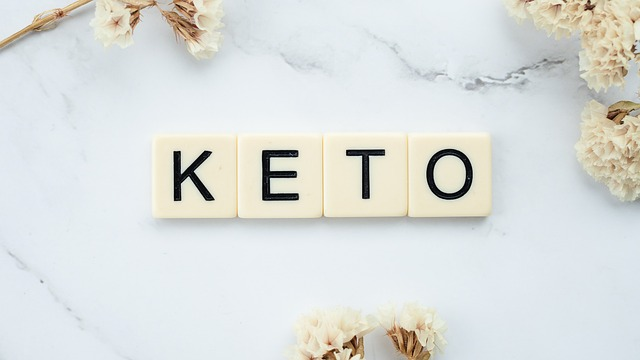
Getting started on keto diets can be easier than you think. Focus on incorporating low-carb, high in saturated fat foods into your meals. Think leafy greens, nuts and seeds, and low-carb vegetables. You'll kickstart your body into a fat-burning machine by minimising your carb intake and upping your healthy fat consumption!
The ketogenic diet offers flexibility, too, with various versions to suit your needs. Whether you opt for the standard ketogenic diet, targeted ketogenic diet, or cyclical ketogenic diet, a method can align with your goals and preferences.
So, are you ready to kickstart your journey to a healthier lifestyle? Embrace the ketogenic diet and unlock the potential for weight loss, improved health markers, and a renewed sense of vitality. Say goodbye to high carb, high-fat diets of the past and embrace the power of healthy fats as your energy and source of energy now. Remember, the road to success begins with a single step, and with the ketogenic diet, that step leads you toward a brighter, healthier future!
Risk: Can I experience constipation if I Don't Eat Enough Fruits and Veggies?

As keto meals are low carb, and high fat, the keto diet minimises carbohydrate intake while emphasising healthy fats. However, one common concern is whether following a keto diet can lead to constipation, mainly if one doesn't consume enough fruits and vegetables. In this blog post, we will explore the potential risk of constipation on the keto diet and the role of fruits and veggies in maintaining a healthy digestive system.
-
Fibre and Digestive Health: Fruits and vegetables are renowned for their high fibre content, crucial in maintaining a healthy digestive system. Fibre adds bulk to the stool, promotes regular bowel movements, and prevents constipation. However, on the keto diet, which restricts carbohydrate consumption, obtaining adequate fibre from traditional high-fibre sources like fruits can take time and effort.
-
Mitigating the Risk of Constipation: While the keto diet may pose a risk of constipation due to limited fruit and vegetable intake, there are ways to address this concern and maintain a healthy digestive system.
-
Include Low-Carb Veggies: Although some vegetables contain carbohydrates, low-carb options can still provide essential nutrients and fibre. Leafy greens like spinach and kale are excellent choices as they offer fibre and important vitamins.
-
Focus on Healthy Fats: The keto diet emphasises high dietary fat intake, which can also help alleviate constipation. Healthy fats, such as those found in avocado, coconut oil, and nuts, can support bowel regularity and prevent digestive issues.
-
Stay Hydrated: Adequate hydration is crucial for maintaining healthy digestion. Drinking plenty of water throughout the day can soften the stool and promote regular bowel movements.
-
Consider Fibre Supplements: Incorporating a fibre supplement can be beneficial if you struggle to meet your fibre needs solely through food sources. Look for low-carb diet options like psyllium husk or flaxseed, which can help alleviate constipation.
-
Consult a Healthcare Professional: If you experience persistent constipation or digestive issues while on the keto diet, it is essential to consult a healthcare professional. They can provide personalised guidance and ensure your dietary choices align with your overall health.
While following a keto diet may increase the risk of constipation due to limited fruit and vegetable intake, there are strategies to mitigate this concern. Incorporating low-carb veggies, focusing on healthy fats, staying hydrated, and considering fibre supplements can help maintain a healthy digestive system. Remember, prioritising a well-rounded, nutrient-dense diet and adopting a healthy lifestyle is crucial for overall well-being, regardless of the specific dietary approach you choose to follow.
Low Carb Diet - What to Eat on a Keto Diet, Hint So Much!
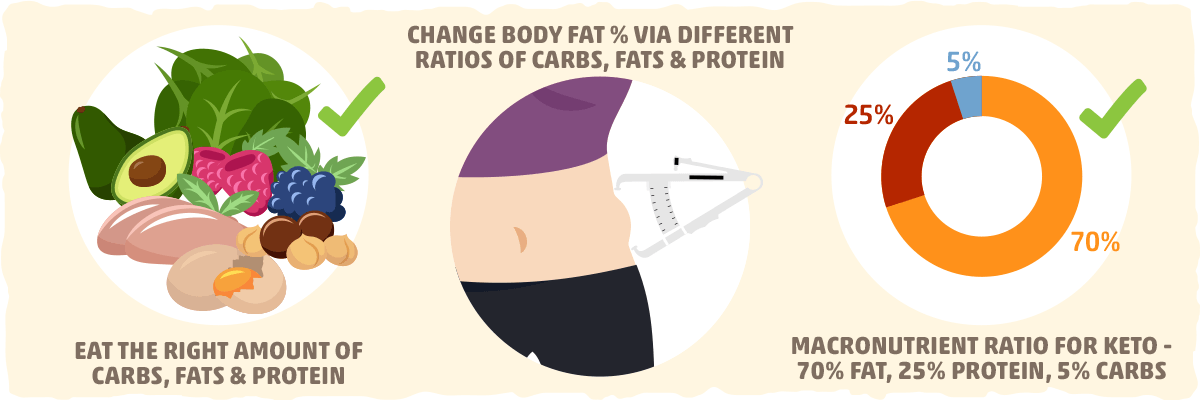
When it comes to what to eat on a keto diet, the options are abundant, giving you so much freedom in your food choices. The ketogenic diet, known for its low-carb and high-fat approach, offers a versatile range of delicious and satisfying meals. By minimising carbohydrate intake and incorporating healthy fats, you can lose weight and improve various health markers such as blood pressure and blood sugar levels.
Goodbye, low-fat diets! With the keto diet, you can savour foods like olive oil, avocados, and nuts, which provide essential nutrients while promoting weight loss and fat metabolism. By focusing on low-carb foods and keeping your net carb intake low, you can keep your body in a metabolic state of ketosis, which burns stored fat for energy.
It's important to strike a balance with protein intake and be mindful of your body's needs. While enjoying protein-rich foods, avoid consuming too much protein, which could interfere with the desired fat-burning process.
With the keto diet, you have very few carbs and the freedom to explore various options, from moderate protein sources to incorporating medium-chain triglycerides to boost fat metabolism. Remember to avoid starchy vegetables and fruit juices, which can be high in carbs. By customising your keto meals to fit within your recommended carbohydrate limit, you can truly embrace the benefits of the keto diet. So enjoy the multitude of delicious possibilities and let your body reap the rewards of this low-carb, high-fat journey!
Foods to enjoy!
Healthy Fats:
-
Avocado
-
Olive oil
-
Coconut oil
-
Butter
-
Ghee
-
MCT oil
Protein Sources:
-
Eggs
-
Fish (salmon, sardines, trout)
-
Meat (beef, chicken, turkey, lamb)
-
Seafood (shrimp, crab, lobster)
-
Poultry (chicken, turkey)
-
Full-fat dairy (cheese, Greek yogurt)
Low-Carb Vegetables:
-
Leafy greens (spinach, kale, lettuce)
-
Broccoli
-
Cauliflower
-
Zucchini
-
Brussels sprouts
-
Asparagus
-
Bell peppers
Nuts and Seeds:
-
Almonds
-
Walnuts
-
Chia seeds
-
Flaxseeds
-
Pumpkin seeds
-
Macadamia nuts
-
Berries (in moderation):
-
Strawberries
-
Blueberries
-
Raspberries
-
Blackberries
-
Full-Fat Dairy Products:
-
Cheese (cheddar, mozzarella, cream cheese)
-
Greek yogurt
-
Heavy cream
Beverages:
-
Water (plain or sparkling)
-
Coffee (black or with heavy cream)
-
Tea (unsweetened)
-
Herbal tea
Other Foods:
-
Dark chocolate (85% cocoa or higher)
-
Nut butter (peanut, almond, or other low-carb options)
-
Olives
-
Herbs and spices
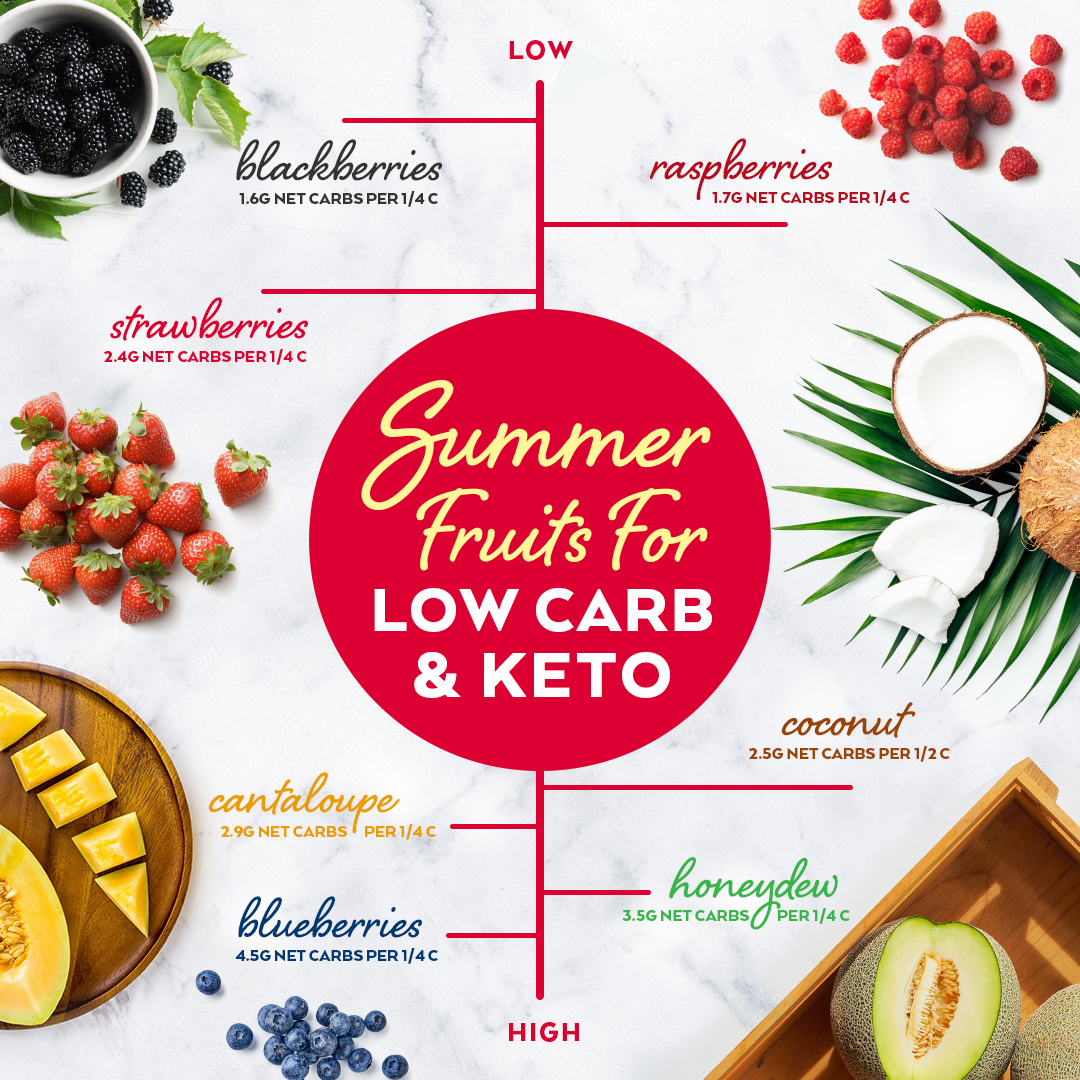
Remember, with keto diets; the key is to focus your food intake on low-carb, high-fat options while avoiding foods high in carbohydrates such as grains, legumes, sugar, and starchy vegetables. It's essential to personalise your food choices based on your specific macronutrient needs and consult with a healthcare professional or registered dietitian before making any significant dietary changes. Enjoy exploring the delicious possibilities and creating satisfying meals while following the principles of the keto diet.
Low Carbohydrate Diet Benefits: You May See Better Blood Glucose Control if You Have Type 2 Diabetes
For people with type 2 diabetes, managing blood glucose levels is crucial for overall health and well-being. While various dietary approaches are available, one method that has shown promising results is the ketogenic diet. This low-carb, high-fat eating plan, known as the keto diet, offers potential benefits beyond weight loss, including improved blood sugar control. This article will explore how adopting a ketogenic diet may positively impact blood glucose levels in individuals with type 2 diabetes.
The metabolic shift that occurs when the body is in ketosis (shift from using glucose as its primary energy source to burning fat) can benefit people with type 2 diabetes, as it helps regulate blood sugar levels and improve insulin sensitivity.
Effect on Blood Glucose Control: The keto diet's low carbohydrate nature can lead to better blood glucose control in individuals with type 2 diabetes. By significantly reducing carb intake, the body experiences fewer blood sugar spikes, leading to more stable glucose levels throughout the day. This can help reduce the need for medication or insulin and promote better overall blood sugar management.
Weight Loss and Insulin Resistance: Weight loss is another significant benefit of the ketogenic diet, and it plays a crucial role in managing type 2 diabetes. Excess body weight contributes to insulin resistance, making it more challenging for cells to respond to insulin properly. By adopting a keto diet and promoting weight loss, individuals with type 2 diabetes can improve insulin sensitivity and enhance their body's ability to use glucose effectively.
Reduced Dependency on Medication: The positive effects of the ketogenic diet on blood glucose control may lead to a decreased reliance on medication for individuals with type 2 diabetes. As blood sugar levels stabilise, medication dosages may need adjustment, or, in some cases, medication requirements may be reduced or eliminated entirely. It's important to work closely with a healthcare professional to monitor blood sugar levels and adjust medication as needed while following a ketogenic diet.
Other Health Benefits: Beyond blood glucose control, the keto diet offers additional health benefits that can benefit individuals with type 2 diabetes. These may include weight loss, reduced blood pressure, improved lipid profile, and decreased risk of cardiovascular disease.
However, it is crucial to prioritise a well-balanced approach and consult with a healthcare professional or registered dietitian to ensure the standard ketogenic diet is tailored to individual needs. It's essential to work with healthcare professionals to ensure the safe and effective implementation of the classic ketogenic diet. With the guidance of healthcare providers and a commitment to a healthy lifestyle, the ketogenic diet can be a valuable tool in managing type 2 diabetes and achieving better blood glucose control.
Carbs List, Foods to Avoid
When following a ketogenic diet, you must be mindful of the foods you should avoid to stay in ketosis. Here are some foods to steer clear of on the keto diet:
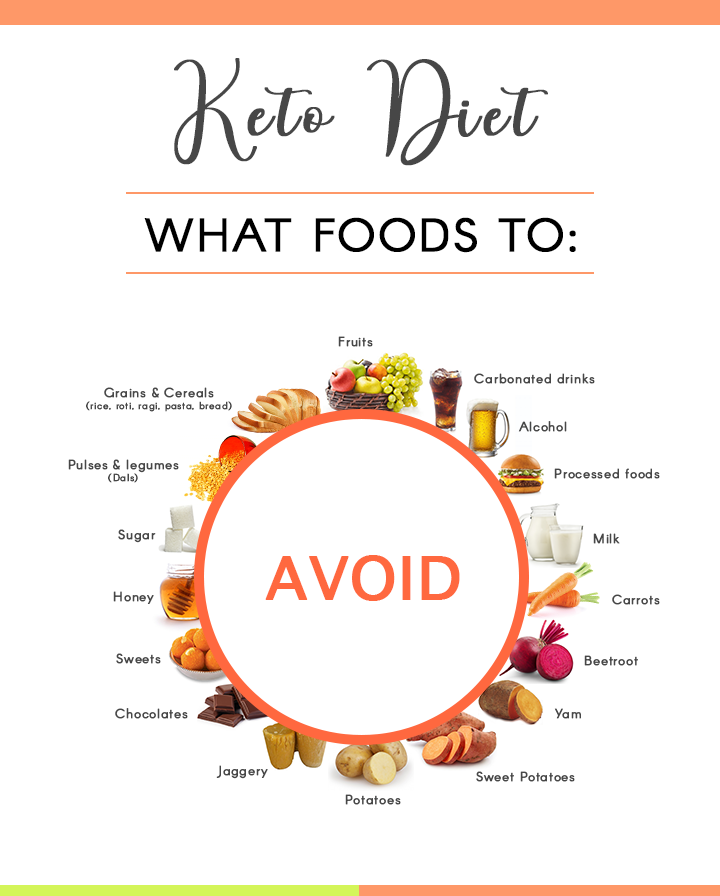
High Carbohydrate Foods:
-
Grains (wheat, rice, oats, corn)
-
Pasta
-
Bread
-
Cereals
-
Cookies
-
Baked goods
-
Pastries
Sugar and Sweeteners:
-
White sugar
-
Brown sugar
-
Honey
-
Maple syrup
-
Agave nectar
-
Artificial sweeteners (aspartame, sucralose)
Starchy Vegetables:
-
Potatoes
-
Sweet potatoes
-
Carrots
-
Peas
-
Corn
-
Beets
Legumes:
-
Beans
-
Lentils
-
Chickpeas
-
Peanuts
Fruits (in large quantities):
-
Bananas
-
Apples
-
Oranges
-
Grapes
-
Pineapples
-
Mangoes
Sugary Beverages:
-
Soda
-
Fruit juice
-
Sweetened tea
-
Sports drinks
-
Energy drinks
Processed Foods:
-
Packaged snacks
-
Chips
-
Crackers
-
Candy
-
Fast food
High Carb Sauces and Condiments:
-
Ketchup
-
Barbecue sauce
-
Teriyaki sauce
-
Salad dressings with added sugar
Alcohol:
-
Beer
-
Sweetened cocktails
-
Sugary wines
Some Dairy Products:
-
Flavoured yogurts
-
Milk (regular or sweetened)
-
Sweetened creamers
Remember, the key to a low-carbohydrate, low-fat diet is to maintain ketosis and maximise the benefits of the ketogenic diet. By avoiding these high-carb and sugary options, you can stay on track and enjoy the many delicious and nutritious alternatives on the keto diet.
Breakfast Recipes That Make Waking Up So Much Easier
Starting your day with a satisfying and keto-friendly breakfast sets the tone for a successful day on the ketogenic diet. Here are some delicious breakfast ideas to kick-start your mornings:

Keto-Friendly Egg Muffins:
-
Whisk together eggs, diced vegetables (such as spinach, bell peppers, and mushrooms), and shredded cheese.
-
Pour the mixture into muffin cups and bake until cooked through.
-
You can also add cooked bacon or sausage for extra flavour.
Avocado Egg Boats:
-
Cut an avocado in half and remove the pit.
-
Scoop out a bit of the flesh to create a larger hollow space.
-
Crack an egg into each avocado half, then bake until the egg is cooked to your liking.
-
Top with salt, pepper, and your favourite herbs.
Low Carb Smoothie:
-
Blend unsweetened almond or coconut milk with a handful of spinach or kale, a scoop of protein powder, a spoonful of nut butter, and a few ice cubes.
-
Add a low-carb sweetener like stevia or a small amount of berries if desired.
-
Blend until smooth and creamy.
Keto Pancakes:
-
Mix almond flour, eggs, and a dash of unsweetened almond milk to create a pancake batter consistency.
-
Cook the batter on a greased skillet until golden brown on both sides.
-
Serve with sugar-free syrup or a dollop of sugar-free whipped cream.
Chia Pudding:
-
Combine chia seeds, unsweetened almond milk, and a low-carb sweetener in a jar or bowl.
-
Stir well and let it sit in the fridge overnight.
-
In the morning, top with fresh berries, chopped nuts, or coconut flakes for added texture and flavour.
Bacon and Egg Wrap:
-
Cook bacon until crispy, then set it aside.
-
In the bacon fat, fry an egg to your liking.
-
Place the egg on a large lettuce leaf or a low-carb tortilla, add bacon strips, and wrap it up.
Greek Yogurt Parfait:
-
Opt for full-fat Greek yogurt and layer it with mixed berries, crushed nuts, and a sprinkle of cinnamon.
-
You can also add a drizzle of sugar-free syrup or a spoonful of almond butter for extra flavour.
Remember to adjust portion sizes and ingredient choices to fit your specific macronutrient goals. These breakfast ideas are delicious and provide a good balance of fats, proteins, and low-carb options to keep you energised and satisfied throughout the morning on the keto diet.

What are the Pros and Cons of the Keto Diet?
Keto diets are known for inducing a metabolic state called ketosis, where the body relies on fat for fuel instead of carbohydrates. However, like any diet, the keto diet has pros and cons. In this article, we'll explore the advantages and drawbacks of the keto diet to help you decide whether it's the right approach for you.
Pros of Low-Carb Diets:
-
Weight Loss: The primary reason people turn to the keto diet is its effectiveness in promoting weight loss. By reducing carbohydrate intake and increasing fat consumption, the body shifts into fat-burning mode, leading to rapid weight loss.
-
Appetite Suppression: A low-carb diet's high fat and moderate protein content can help curb hunger and reduce food cravings, leading to lower calorie intake and better adherence to the diet.
-
Improved Blood Sugar Control: Ketogenic diets have shown potential in helping individuals with diabetes or insulin resistance manage their blood sugar levels more effectively, reducing the need for medication and improving overall blood sugar control.
-
Increased Energy and Mental Clarity: When the body adapts to using ketones as its primary fuel source, many individuals report increased energy levels, improved mental focus, and clarity throughout the day.
-
Potential Health Benefits: Some studies suggest that the keto diet positively affects heart health by reducing levels of triglycerides, LDL cholesterol, and blood pressure. It may also improve markers of metabolic syndrome and reduce the risk of certain chronic diseases.
Cons of a Low-Carb Diet:
-
Restrictive Nature: The keto diet is highly restrictive, requiring significant changes in food choices and macronutrient ratios. This can be challenging for some individuals to maintain long-term, leading to potential feelings of deprivation and difficulty socialising.
-
Keto Flu and Initial Side Effects: When transitioning into ketosis, some people experience symptoms such as fatigue, headaches, dizziness, and brain fog, commonly known as the keto flu. These side effects are temporary but can be bothersome during the adjustment period.
-
Nutrient Deficiencies: Due to the limited food choices on the keto diet, it may be challenging to obtain an adequate intake of specific vitamins, minerals, and fibre. Planning meals carefully and considering supplementation to prevent potential deficiencies is crucial.
-
Limited Carbohydrate Intake: The strict carbohydrate restriction of the keto diet may make it difficult for those who engage in intense physical activity or require higher carbohydrate intake for specific health conditions, such as athletes or individuals with certain medical conditions.
Low-carbohydrate diets can be powerful for weight loss and blood sugar control, offering numerous potential benefits. However, it's crucial to consider the diet's restrictive nature, possible side effects, and long-term sustainability. Before starting the keto diet, it's best to consult with a healthcare professional or registered dietitian to ensure it aligns with your individual health goals and needs. Remember, every person is unique, and what works for one may not work for another. Ultimately, adopting the keto diet should be based on carefully considering its pros and cons and committing to a healthy lifestyle.
Benefit: You May See Improvements in Your Athletic Performance

When it comes to athletic performance, fueling your body with the proper nutrients is essential. The ketogenic diet, known for its low carbohydrate and high-fat composition, has gained attention in the athletic community. While initially developed for managing epilepsy, the ketogenic diet may offer additional benefits for athletes seeking to optimise their performance. This article will explore how the ketogenic diet can improve athletic performance and support your fitness goals.
-
Fueling with Fat: One of the primary advantages of the ketogenic diet for athletes is its ability to shift the body's primary fuel source from carbohydrates to fat. By significantly reducing carbohydrate intake, the body enters a state of ketosis, using stored fat as its primary energy source. This can be particularly beneficial for endurance athletes who rely on a steady supply of burning fat as energy during prolonged exercise.
-
Enhanced Endurance: Adopting a ketogenic diet may improve endurance performance. When the body becomes efficient at burning fat for fuel, it can sustain energy levels over extended periods without relying heavily on frequent carbohydrate intake. This can delay the onset of fatigue, allowing athletes to push harder and go longer during their training sessions or competitions.
-
Steadier Blood Sugar Levels: The ketogenic diet's low carbohydrate content helps stabilise blood sugar levels, preventing rapid spikes and crashes often associated with consuming high-carb meals. By maintaining more stable blood sugar levels, athletes who follow targeted ketogenic diets can experience sustained energy throughout their workouts or events, avoiding the energy crashes that can hinder performance.
-
Reduced Inflammation: Inflammation can impact athletic performance and recovery. Some evidence suggests that the ketogenic diet's anti-inflammatory effects may help reduce exercise-induced inflammation, potentially leading to faster recovery and improved overall performance. Athletes may experience less muscle soreness and enhanced muscle inflammation repair by reducing inflammation.
-
Weight Loss and Body Composition: The ketogenic diet may be valuable for athletes looking to lose weight or improve body composition. The diet's high-fat content and low carbohydrate intake can promote further body fat loss while preserving lean muscle mass. By shedding excess body fat, athletes can achieve a more favourable body composition, which may enhance performance in sports that require speed, agility, and power.
-
Important Considerations: While the ketogenic diet may benefit athletic performance, it's crucial to consider individual needs and preferences. Adapting to a low carbohydrate, full protein, high-fat diet can be challenging initially, and some athletes may experience a temporary dip in performance during the transition phase, commonly known as the "keto flu." Working with a qualified healthcare professional or registered dietitian is essential to ensure adequate nutrient intake and address any concerns or potential vitamin and mineral deficiencies.
The ketogenic diet may offer some advantages if you're an athlete seeking to optimise your performance. Enhanced endurance, steadier blood sugar levels, reduced inflammation, and potential improvements in body composition are among the potential benefits. However, it's essential to approach the ketogenic diet with careful planning and personalised guidance to ensure it aligns with your specific goals and needs. Remember, each athlete is unique, and finding the right balance of macronutrients is key. With proper consideration and support, the ketogenic diet may serve as a valuable tool to elevate your athletic performance to new heights.
I'm Dying to Know: Will the Keto Diet Help Me Lose Weight?
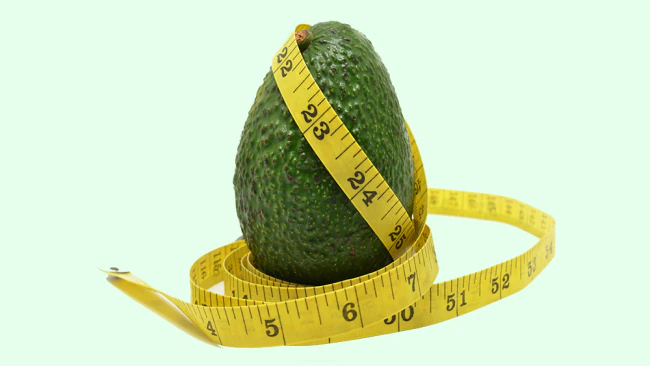
One of the key benefits of the ketogenic diet is its potential for weight loss. By restricting carbohydrate intake, the body's insulin levels decrease, leading to reduced storage of fat. Additionally, the diet's high fat and moderate protein content can help control hunger and promote satiety, which may lead to lower calorie intake overall. As a result, many individuals experience significant weight loss when following a well-formulated ketogenic diet.
-
Fat Loss and Preserved Muscle Mass: When the body is in a state of ketosis, it becomes highly efficient at burning fat for fuel. This can lead to overall body weight loss and reduced body fat percentage. The ketogenic diet aims to burn fat enough to spare muscle mass while primarily targeting stored fat, which is beneficial for body composition and long-term weight management.
Ketogenic diets have gained popularity as a weight loss approach, and it has yielded successful results for many people. By promoting fat loss, controlling hunger, and offering potential health benefits, the keto diet can be an effective tool in achieving weight loss goals. However, it is essential to approach the diet with proper planning, seek guidance from a healthcare professional or registered dietitian, and consider individual needs and preferences. Remember, sustainable weight loss involves adopting a well-rounded, balanced approach that encompasses healthy eating, regular physical activity, and a mindset focused on long-term lifestyle changes.

